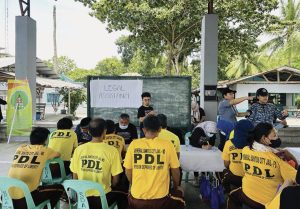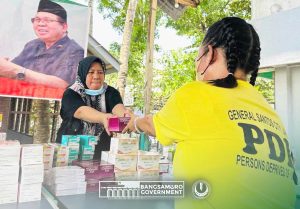
GSCJ’s Bangsamoro PDLs line up for the legal assistance rendered by the NCMF. (Hamdan Badrudin/BIO)
Discrimination is figuratively an incurable disease that has existed for as long as we can remember.
People, such as convicts, who spent most of their lives imprisoned, were besmirched with negative connotations, which had a severe impact on their self-esteem and morale, among those who knew less about them.
Lagi, a Bangsamoro person deprived of liberty (PDL) at General Santos City Jail (GSCJ), expressed his gratitude to the Bangsamoro Autonomous Region in Muslim Mindanao (BARMM) Government for the help provided them, despite the numerous unfavorable and antagonistic opinions about them— the jailbirds.
“Nagpapasalamat ako sa Bangsamoro Government dahil kahit ganito lang kami, bihira lang magkaroon ng dalaw, hindi sila nagdalawang-isip na bisitahin kami at magbigay ng tulong,” he said. [I thank the Bangsamoro Government because even if we are PDLs, who rarely receive visitors, the government did not have second thoughts as to extending their aid to us.

A female Bangsamoro PDL receives medical assistance from Project TABANG. (Hamdan Badrudin/BIO)
As defined, a PDL is a person who has been arrested, held in lawful custody, detained, or imprisoned in the execution of a lawful sentence. On July 31, a total of 202 Bangsamoro PDLs at the GSCJ received a range of essential services, including legal, medical, psychosocial, and relief assistance.
This initiative was led by various ministries, offices, and agencies (MOAs) of the interim government, such as the Office for Other Bangsamoro Communities (OOBC), Ministry of Social Services and Development (MSSD), Office of the Chief Minister’s (OCM) Project Tulong Alay sa Bangsamorong Nangangailangan (TABANG), and Bangsamoro Women Commission (BWC).
Partners in this intervention involved the National Commission on Muslim Filipinos (NCMF), the Consortium on the Bangsamoro Civil Society Support to the Bangsamoro Transition (CBCS-SUBATRA), and the Bangsamoro Development Agency (BDA).
OOBC Executive Director Noron Andan highlighted that these activities align with the principles of moral governance and inclusivity in serving the Bangsamoro community. “It does not mean that the Bangsamoro Government’s programs end just because they are behind the bars of the prison cells,” Andan emphasized.
“If we extend help to calamity stricken Bangsamoro families, we also need to provide aid to these PDLs. They can also be compared to the victims of fire incidents; the only difference is that what is being burned is their future, so we need to include them in our initiatives, regardless of where they are now,” he added.
He also urged the PDLs to make positive changes, saying, “As human beings, it is innate that we commit mistakes; however, let us strive to correct our wrongdoings.” The beneficiaries included 146 male and 56 female PDLs.
Under Section 12, Article VI of the Bangsamoro Organic Law (BOL), the Bangsamoro Government, in coordination with local government units where other Bangsamoro communities are located, and the appropriate national government
agencies, is mandated to assist in enhancing their economic, social, and cultural development.
Positive transformation Lagi also mentioned how his almost nine years behind bars transformed him and his fellow PDLs.
For almost a decade, he has been an Ustadz, a pedagogue who focuses on Islamic teachings, to his co-Bangsamoro PDLs, centering his instruction on Arabic alphabets and basic reading.
“Dahil sa ginagawa kong ito, mas nabigyan ako ng pag-asa na magpatuloy sa buhay,” Lagi stated. [Because of what I have been doing, I was given hope to move forward with life.]
“Napagtanto ko na posible rin pala akong makatulong sa kapwa ko kahit sa maliit lamang na paraan,” he added.
[I realized that I can also help others even in the smallest way possible.] Lagi continued, “May mga kasama akong nakalaya na nagpasalamat sakin dahil nakatulong ako sa kanila sa aspetong Islam.”
[I had fellow PDLs, released from here, who thanked me for helping them in the aspect of Islam.] For every good conduct and exemplary behavior of a PDL inside the jail, he becomes entitled to Good Conduct Time Allowance (GCTA).
Under the Implementing Rules and Regulations (IRR) of Republic Act No. 10592, GCTA is defined as a privilege granted to a prisoner, whether detained or convicted by final judgment, entitling him to a reduction of his jail or prison term for every month of actual detention or service of a sentence as a reward for good conduct and exemplary behavior.
On the other hand, Lagi looks forward to having Islamic Studies and Arabic Language (ISAL) teachers from the Bangsamoro Government, through the Ministry of Basic, Higher, and Technical Education (MBHTE), to teach a higher level of Islamic teachings at the GSCJ.
“Sana magkaroon ng ISAL teachers dito, galing sa Bangsamoro Government, para makapagturo tungkol sa Islam dahil simple at pangunahing katuruan sa relihiyon lamang ang aking naituturo,” said Lagi.
[I hope that ISAL teachers from the Bangsamoro Government will be made available here, for I only teach basic and primary Islamic teachings.]
“Sa BARMM Government, kahit hindi na araw-araw na nandito kayo, ang importante ay may napaaabot pa ring programa sa amin at sana mas marami pa kayong matulungan,” he added.
[To the BARMM Government, it is not essential that pay a visit every day; what is necessary is that you extend your programs to us, and may you help more Bangsamoro.] (Johamin Inok/BIO)







